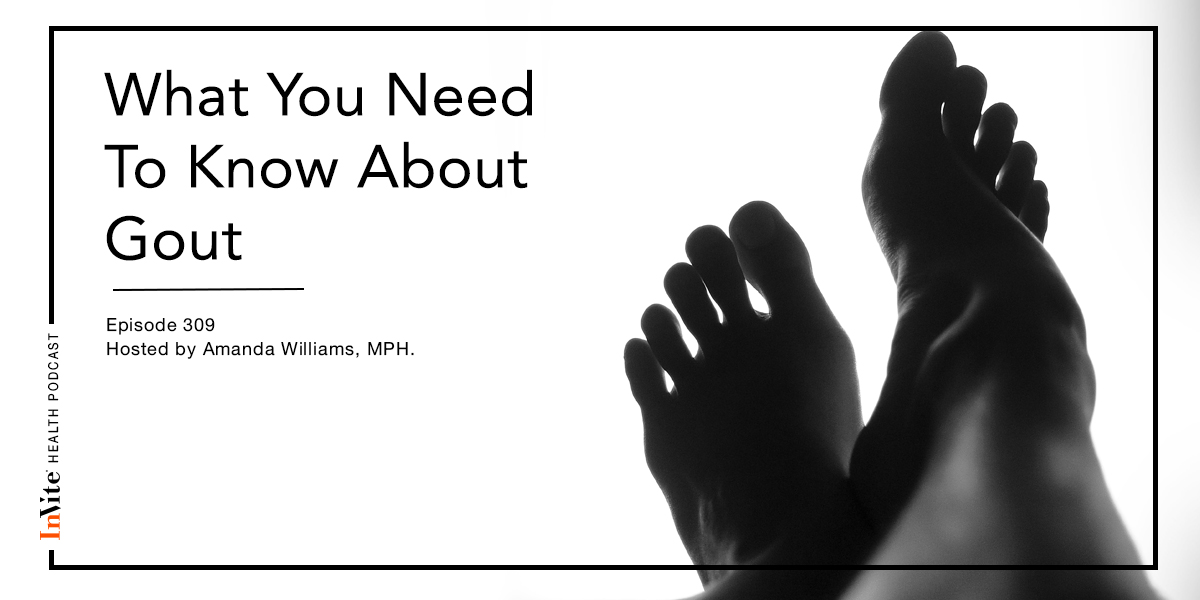What You Need To Know About Gout – InVite Health Podcast, Episode 309

Invite Health Podcast, Episode hosted by Amanda Williams, MPH
Subscribe Today!
It’s interesting when we talk about arthritis that many times we overlook gout. Gout is one of the oldest known and most common forms of arthritis. In the world of arthritis, we usually focus in on osteoarthritis as well as rheumatoid arthritis followed by psoriatic arthritis, which includes skin involvement along with the manifestations that occur within the joints. But gout is an incredibly painful form and I want to talk about that in some detail today so you have some better understanding of some of the things that can exacerbate gout and things you can be doing to better manage your gout. Today, I want to focus in on some of the most characteristic factors that go along with gout.†
What causes gout?
What we know about gout is that it is incredibly painful inflammation of one or more joints of the extremities. Oftentimes, people think about the big toe and that is usually the most common place where people will suffer an acute attack of gout. What happens is that it creates these nodules within the soft tissues and this can create a lot of discomfort.†
If you’ve ever talked to someone who has had a gout attack, they will tell you that they just want it to go away. They usually turn toward things like anti-inflammatories and they try to apply ice and elevate. Sometimes that just doesn’t work. For many people who have had more frequent gout attacks, sometimes they are actually put on prescribed medications by their physician to try to regulate the uric acid.†
What To do About Bursitis, A Painful Joint Condition – InVite Health Podcast, Episode 258. Listen Now >>
Elevated levels of uric acid, which is a metabolic byproduct, are the primary risk factor for developing gout. The uric acid is circulating in the blood and if the level gets to be too high, then this is the real issue. This is what we called hyperuricemia. When we realize someone has hyperuricemia, then we have to watch out for the potential of a gout attack.†
Learn more about various factors that can increase your risk of developing gout by listening to the full podcast episode.
Factors that help and hurt uric acid levels
Sometimes people think they should have things that are high in Vitamin C because we know Vitamin C is very helpful. Vitamin C significantly reduces uric acid by inhibiting an enzyme known as xanthine oxidase. This does not mean, however, that you should drink a ton of orange juice. You should not do this because we know that the fructose in the orange juice can actually be an exacerbating factor to gout. You have to know what you should be doing and what you shouldn’t be doing.†
There are a few different lifestyle and dietary modifications that someone who has a history of gout attacks or has a history of having elevated uric acid levels needs to be aware of. Exercise is definitely important. The more weight we carry, the higher association with having elevated uric acid levels. Limiting the intake of red meat and consuming lower dairy products are certainly going to be important. It is also important to make sure that you are consuming more things in the Mediterranean diet because they help to downregulate the uric acid levels in the body.†
Studies Show This Unique Collagen Eases Inflammation – InVite Health Podcast, Episode 286. Listen Now >>
When we talk about what we should be doing as far as our supplementation routine, we should be including Vitamin C. Ideally, we should take at least 1000mg of Vitamin C every single day to help with more of that normalization of the blood uric acid levels. B-Vitamins are also another area of interesting research with gout. They have actually found that folate in particular is a significant player in this regulation. Those who have gout attacks have higher uric acid and lower folate levels. They have found that giving these people folate on a regular basis also was helping to support all of this.†
Tune into the full podcast episode to hear more of Amanda’s recommendations for helping with gout.
Thank you for tuning in to the Invite Health Podcast. You can find all of our episodes for free wherever you listen to podcasts or by visiting www.invitehealth.com/podcast. Make sure you subscribe and leave us a review! Follow us on Facebook, Twitter and Instagram at Invite Health today. We’ll see you next time on another episode of the Invite Health Podcast.


